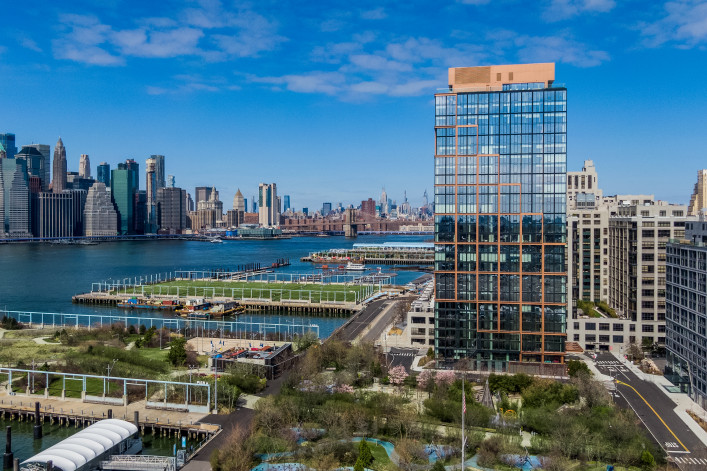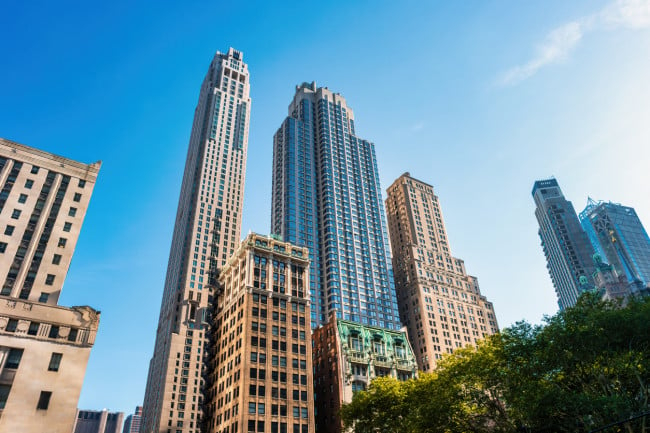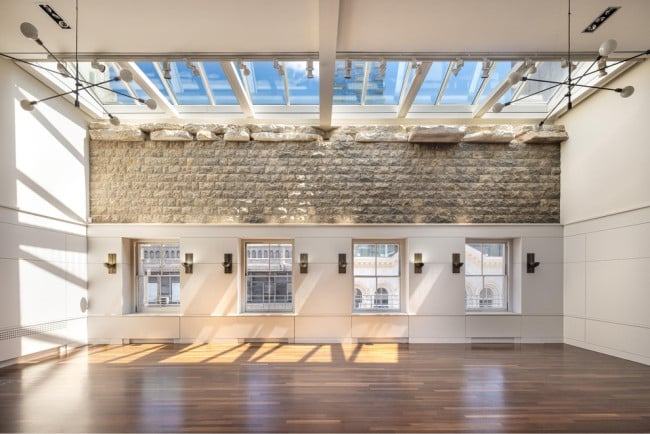What are land-lease buildings? Are they common in NYC?
- Co-ops and condos that rent the land they sit on are land-lease buildings
- Key considerations are who owns the land and when the lease ends
- Increases in land rent impact monthly maintenance and common charges

Quay Tower in Brooklyn Bridge Park is a land-lease condo building that rents its site from New York City.
Quay Tower
The vast majority of residential buildings in New York City own the land they sit on, but a tiny percentage rent the land from someone else. These are called land-lease (or ground-lease) buildings, yet another quirk of NYC real estate that buyers need to be aware of.
"In a lot of ways, a land lease is just like any other lease. It allows the building to occupy the property according to the specific terms of the lease," says attorney Adam Stone of The Stone Law Firm, which specializes in real estate. (Stone has also taught real estate classes on the subject for years).
These buildings are mostly in Manhattan, namely on the Upper West and East sides, as well as in Battery Park. Brooklyn has a smattering, too.
The reason behind this rarity is largely tax-driven for the landowners, says Adam R. Sanders, a partner at NYC-based real estate law firm Rosenberg & Estis, (a Brick sponsor). “By leasing rather than selling the land, an individual landowner or company gets to keep the revenue stream from the property without having to take a tax hit from the sale of the property,” Sanders says.
Due to the unusual nature of the underlying lease, anyone thinking of buying into a land-lease building should consider the potential risks, outlined below.
Co-op vs. condo land-lease buildings
There are about 100 land-lease co-ops and only a handful of land-lease condos. That's because of the different ownership structures: In a co-op, you only own a percentage of the shares and not the property itself, whereas in a condo, you are actually getting a deed. So technically, a condo cannot sell units if it doesn't own the land, though exceptions exist.
For example, there are condo buildings on Roosevelt Island and in Battery Park that lease their sites from NYC, and buildings such as Quay Tower in Brooklyn Heights.
"Instead of paying property taxes, individual owners who live in these buildings are charged PILOT (Payment in Lieu of Taxes) payments, which the city uses to fund improvements to the neighborhood," says Jim Hayes, a broker at SERHANT. He adds that Quay Tower was part of the original design of Brooklyn Bridge Park and the PILOT payments go toward the park's upkeep and development.
Other condos have devised workarounds where they function more like co-ops, with unit owners getting a piece of the land lease, though ultimately the landowner retains 100 percent of the control.
Stone says the important concerns around land leases are the same for co-ops and condos. "It is important to have a lawyer review all of the due diligence documents, especially a lawyer familiar with land leases."
Quay agrees, saying he works with buyers as they see how the deal is set up through the offering plan and the lease agreement.
How long do the land leases run?
This is the pivotal question for buyers—and should be provided in the listing.
Many co-op land leases are for 50 years, while others—particularly condos on state-owned land—may run for longer. It often boils down to who the owner is, which is the second piece of information to nail down (and often not provided in the listing).
For example, the land lease at Quay Tower runs out in 2109.
"As you get closer to the termination date, the value of the property drastically decreases, as does the ability to sell the units," Sanders says.
So knowing when the lease expires is important. "The unknown of what could happen can be scarier for, say, a land-lease co-op on the UES with 15 years left on the lease, when the light at the end of the tunnel is much brighter," Hayes says.
What happens at the end of the land lease?
Herein lies the rub. Effectively, the building reverts to the landowner, who could terminate every proprietary lease, which is always subordinate to the land lease, Sanders says.
The specifics would be contained in each building’s land-lease agreement. But generally, the co-op or condo no longer has the right to occupy that land, meaning each unit owner would have to vacate and would no longer have any ownership of their apartments.
According to Stone, the landowner could extend the lease (which does happen) or lease the building to another entity. They could also repurpose the building or knock it down and build something else, or they can sell it and then the new owner has the same rights.
There are examples of where a co-op has been able to buy the land (including at Trump Plaza), but there are just as many others where the shareholders couldn't afford to do that.
"If the rent resets to market value or if there's a balloon payment, buildings run into big problems with the increased costs and may try to buy out the lease, which could also then cause a huge assessment," Sanders says.
Again, check the track record of the landowner to see if there's cause for concern.
Does a land lease impact carrying costs?
Here's another reality to consider. "The mere fact that the co-op or condo building has to pay rent to the landowner adds an additional cost for the building, so the carrying charges are usually higher," Stone says.
Land leases usually involve incremental escalations. "When the rent payments go up, the monthly maintenance will go up," Sanders says. "It's just like when mortgage rates rise; if the co-ops refinance at a higher interest rate, they need to increase the maintenance."
For example, Hayes says the lease at Quay Tower increases 7.5 percent every five years, and that this cost will result in a similar bump in common charges.
On the flip side, some sellers will try and offset these added risks with lower prices or closing credits, though that's not true across the board.
Hayes says the units at Quay Tower are on par with the market for similar full-service buildings in Brooklyn—and at least a couple of recent sales have topped the weekly records. "Whether you see a discount ultimately comes down to the unit size, the age of the building, and other nuances of pricing."
Is it harder to get a mortgage?
The easy answer is yes.
"Banks generally do not like anything out of the ordinary, though enough are familiar with land-lease buildings and are willing to lend—but not every bank," Stone says.
Plenty of buyers do obtain financing, though you should do your due diligence in gathering all the pertinent information before you apply. The longer the lease term, the better.
The landowner also matters—the city, for example, is not as likely as a random company that's in the business of leasing land to leave individual owners high and dry.
You Might Also Like




























